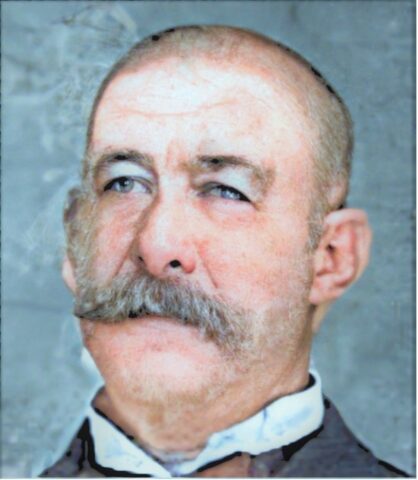Jonas and the Green Cape
Jonas/Yonah Wahnon
By Brian Porro
When I read the article by my friend and friend of Gibraltar, Martí Crespo, in the Gibraltar Chronicle on 6th March 2024 entitled ‘The Architect with Menorcan Roots Behind the Design of Gibraltar’s Sacred Heart Church,’ I sensed a note of surprise in the description of Temistio Tudury’s journey – how one branch of his family, Sebastià Tudury, moved to the Azores, leading to Temistio being born there.
To me, however, this wasn’t particularly surprising. For reasons I might share over a drink the next time I’m in Gibraltar, I had been delving deeper into my Jewish relatives’ histories and family trees. My mother’s family, the Cohens, connects to the Attias and Wahnon families locally. While researching the Wahnon branches, I discovered fascinating details about naming traditions and stumbled upon some exciting relatives, including my great-great-great-granduncle, Jonas Wahnon.
Jonas’s story is extraordinary. He was, famously, the first Wahnon to emigrate to Cape Verde but tracing him initially proved tricky. His name appeared with various spellings: Yonah, Yonas, Jona, and Jonas. As discussed elsewhere in the context of Gibraltar’s linguistic history, the use of ‘Y’ or ‘J’ often depended on the recorder’s linguistic and educational or cultural background, since ‘y’ and the English ‘j’ has sounded similar to our ears in the past, and the final ‘h’ probably reflected the aspiration or loss of final ‘s’ in Gibraltar’s language. But eventually I gathered all the information I needed.
Jonas Wahnon was born in Gibraltar on 25th July 1812 to Jacob and Simi Wahnon, who were my great-great-great-great-grandparents, making him my great-great-great-granduncle. Interestingly, his mother Simi’s maiden name was also Wahnon – Jacob and Simi were first cousins, a common occurrence in small, tight-knit communities.
By the time the 1834 Census was taken, Jonas, then 21, was living with his widowed mother Simi and several siblings. His occupation was listed as ‘dealer,’ while one brother worked as a bumboatman and his sisters were seamstresses or of school age. Around 1840, Jonas married Meriam Benside Cohen and they had five children, including Isaac, born in 1843.
The family’s connection to Cape Verde began in the 1860s, reportedly through a partnership between Jonas and James (Haim) Levy Bentubo. Whether Jonas’ son Isaac moved first or Jonas himself led the way remains unclear but, by 1865, both father and son had relocated to Cape Verde, a Portuguese territory with growing British influence as a coaling hub. This commercial potential would have been well-known in Gibraltar, itself a strategic British outpost. Following international treaties between the UK and Portugal, British entrepreneurs had the right to set themselves up and run businesses in Portuguese territory and Gibraltarians were also able to benefit from those arrangements, irrespective of their faith or origins, because they also were British subjects.
The Wahnons established themselves on different Cape Verdean islands. Jonas took up farming in Santo Antão, suggesting improvements, such as the introduction of chickpeas as a more viable crop than wheat, which did not do as well in that environment. His innovation had a lasting impact on local agriculture. As part of settling in, Jonas took on a second family – with Gertrude Benvinda Maria de Jesus Ferreira, who was born in 1840 in Setubal, Portugal, daughter of Ana and Manuel, he had a further four sons and one daughter between 1868 and 1878. Gertrude died on 18 March 1908 in Cape Verde at the age of 68.
Meanwhile, Isaac, Jonas’ son by Meriam, and his wife Rachel Levy Bentubo settled on São Vicente, where they opened the island’s first hotel. Their establishment flourished as Cape Verde became a bustling refuelling stop, and his hotel hosted notable figures such as Prince Albert of Belgium and John Rockefeller.

Isaac Wahnon
Isaac and Rachel had 14 children, many of whom played key roles in Cape Verde’s development. Among their descendants is Carlos Alberto Wahnon de Carvalho Veiga, the first democratically elected Prime Minister of Cape Verde (1991–2001). He was instrumental in transitioning Cape Verde into a pluralist democracy and one of Africa’s most developed nations.
Jonas’s Gibraltarian wife Meriam appears not to have chosen to join him in Cape Verde, remaining active in Lisbon’s Jewish community until her death in 1889. Jonas himself probably travelled frequently between Lisbon and Cape Verde but died in Lisbon in 1895 at the age of 83. He and Meriam are both buried in the city’s Jewish Cemetery.

Gertrudes Benvinda Maria de Jesus Victorino Ferreira - Yonah's Cape Verde wife
Interestingly, Jonas worked to preserve the family’s Jewish identity, marrying two of his Cape Verdean sons to daughters of James Levy Bentubo. The weddings were held in Gibraltar, maintaining ties to both Judaism and their homeland. However, by the early 20th Century, interfaith marriages became increasingly common among Jewish families in Gibraltar and other places where the Jewish community was relatively small. In Cape Verde, many if not all of the descendants of my Jewish relatives married local Catholics but continued to bury their dead according to Jewish ritual.
Jonas Wahnon’s legacy spans continents and generations, from the agricultural fields of Cape Verde to the halls of political leadership. His life exemplifies the resilience, adaptability, and interconnectedness of Gibraltar’s Jewish community – a legacy I’m proud to share.









